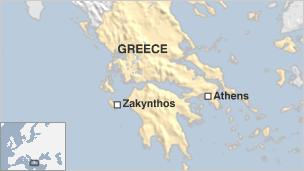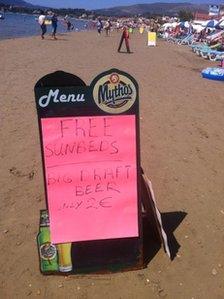Journey across crisis-hit Greece
- Published
Mark Lowen reports
Zakynthos (Zante) is an island of stark contrasts. On one side are the small fishing villages and traditional hamlets dotted across the lush mountains - a taste of the old Greece.
But just a few minutes' drive away lies the other face: the hedonistic paradise of Laganas town - rows of nightclubs and fast-food joints drawing the young, and mainly British, crowd.
Chubby Burgers, Insomnia, the Three Lions' Pub all line the main strip, quad bikes roaring up and down and the bars screeching to a night-time beat of cheap drinks and easy hook-ups.
But there is one common thread tying the two sides together: a sudden and dramatic drop in tourism that is worrying many on this picturesque island.
British visitors are down by an estimated 20% on last year, Germans by over 40%, Irish by a half. The tourist figures make for grim reading: overall numbers declining by a fifth.
'Misrepresentation'

Sandra Bere said she had considered cancelling after seeing pictures of the unrest on the news
And it is a pattern reflected across Greece.
Tourism is the lifeblood of the Greek economy. It makes up almost 20% of the country's economic output - the largest share - and an estimated one in five Greeks works in the industry.
But despite individual success stories, tourism has taken a hit. Behind the drop is a toxic mix of financial hardship abroad and Greece's own financial - and now political - crisis.
The country has been rocked by months of anti-austerity demonstrations.
Hostility towards Germany has increased as Greeks have hit out against a German government that has pushed the cost-cutting here.
And inconclusive elections last month raised fresh questions about Greece's continuing membership of the Euro.
"I've had questions from potential customers over whether there's enough food and currency in the country or will they be able to get off the island," laments Christina Tetradis, President of the Laganas Hotels Association.
"This is all down to a misrepresentation of the situation in the media and it must stop. Whatever is happening in Athens is not affecting the rest of Greece."
Her particular hotel on the beachfront in Laganas does appear to be coping, with strong bookings in the early season.

But around the pool, British tourists are becoming aware of the problems.
Liz White and her family have been coming to Zakynthos for 23 years. "I've never seen it so quiet," she tells me. "Years ago, the bars were thriving - not now."
Empty deckchairs
"I booked the holiday before I saw what was happening here," says Sandra Bere from Liverpool.
"I was frightened when I saw the pictures on television and thought about cancelling - but it's been fine here. When I told my colleagues I was going to Greece, you could see from their faces that they wouldn't have gone."
A few kilometres away, the situation is far more dramatic. The beautiful Ilaria boutique hotel is set away from the seafront around a huge garden pool.

Ms Tassourbi says that if the current trend continues, her hotel could be forced to close
But the deckchairs lie virtually empty and the restaurant area is eerily quiet. Just three of the 38 rooms are currently occupied - compared to 20 this time last year.
"If things continue like this, we will not have the money to employ the staff - and we will be forced to close," says Stavroula Tassourbi, the reservations manager.
"We used to have a lot of people coming and that would give us work and pleasure. Now we feel useless."
As well as the media, anger here is also directed against Greece's politicians who proved unable to bridge their divisions after last month's election and form a coalition government at a time of dire need.
So split are they over whether to accept or reject the country's international bailout and further cost-cutting, that a second election is now to take place in mid-June.
Currency concerns

Businesses seek to entice customers with special offers but trade is slow
The political vacuum - and the chance of a government being formed that rejects the bailout agreement - have led European leaders to discuss openly the possibility of a Greek exit from the eurozone.
And while prices here would plummet if Greece were to return to the drachma - potentially attracting more tourists - the social and economic chaos that would likely ensue makes locals tremble at the thought.
"People are frightened that Greece will leave the euro, thinking that it would ruin their holiday," says Ms Tetradis.
"And if they only have one holiday a year, they think, 'well - I'll go there another time'."
But this country is craving tourism now - not at another time.
It gives a rare boost to Greece's uncompetitive economy and restores the image of a country battered by five years of recession and seemingly endless social unrest. But it is not forthcoming.
Around the clear, warm waters of Zakynthos island lies a unique attraction: dozens of loggerhead turtles in the largest nesting area in the Mediterranean.
They glide through the water, rearing their heads above the waves. The metre-long (3ft) creatures are an endangered species. But it is increasingly tourism itself here that is under threat.
This nation - tired of recession and perpetual crises - has its arms wide open to tourists. And any government that comes into power here will face immense pressure to aid a vital industry that could give Greece a chance of emerging from the current darkness.